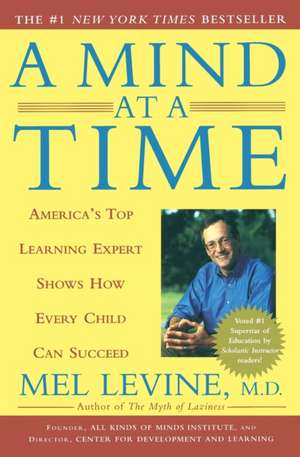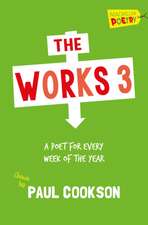A Mind at a Time: America's Top Learning Expert Shows How Every Child Can Succeed
Autor Melvin D. Levineen Limba Engleză Paperback – 31 dec 2002
In his #1 New York Times bestseller A Mind at a Time, Dr. Levine shows parents and those who care for children how to identify these individual learning patterns, explaining how they can strengthen a child's abilities and either bypass or help overcome the child's weaknesses, producing positive results instead of repeated frustration and failure.
Consistent progress can result when we understand that not every child can do equally well in every type of learning and begin to pay more attention to individual learning patterns -- and individual minds -- so that we can maximize children's success and gratification in life. In A Mind at a Time Dr. Levine shows us how.
Preț: 105.12 lei
Nou
Puncte Express: 158
Preț estimativ în valută:
20.12€ • 21.86$ • 16.91£
20.12€ • 21.86$ • 16.91£
Carte disponibilă
Livrare economică 31 martie-14 aprilie
Preluare comenzi: 021 569.72.76
Specificații
ISBN-13: 9780743202237
ISBN-10: 0743202236
Pagini: 352
Dimensiuni: 143 x 215 x 24 mm
Greutate: 0.33 kg
Ediția:Reprint
Editura: Simon&Schuster
ISBN-10: 0743202236
Pagini: 352
Dimensiuni: 143 x 215 x 24 mm
Greutate: 0.33 kg
Ediția:Reprint
Editura: Simon&Schuster
Notă biografică
Dr. Mel Levine is a professor of pediatrics at the University of North Carolina Medical School and the director of the university's Clinical Center for the Study of Development and Learning. He is also the founder and cochair of All Kinds of Minds, a nonprofit institute that develops products and programs to help parents, teachers, clinicians, and children deal with differences in learning. A Rhodes scholar and graduate of Harvard Medical School, Dr. Levine lives on a farm in Rougemont, North Carolina, with his wife, Bambi, and many animals.
Descriere
In this groundbreaking investigation of the nature of learning, renowned learning expert Dr. Mel Levine explores the wide diversity of learning styles and shows parents how they can observe and understand their children's minds by using breakthrough strategies for overcoming the weaknesses that hold kids back.
Cuprins
Contents
Acknowledgments
1 A Mind at a Time: Introduction
A Mind's Possibilities
A Pediatric Perspective
2 The Ways of Learning
How Learning Works
Eight Systems
Neurodevelopmental Profiles
How a Mind's Profile Comes to Be
How Lifestyles May Affect Learning Styles
Splitting Rather Than Lumping
The Early Detection of Dysfunction
Some Adult Implications
3 Conducting a Mind: Our Attention Control System
The Mental Energy Controls
The Intake Controls
The Output Controls
The Impacts of the Attention Controls
Minds over Time: Keeping a Watchful Eye on the Attention Controls as Children Age
Practical Considerations
4 Remembering to Learn and Learning to Remember: Our Memory System
Short-term Memory
Active Working Memory
Long-term Memory
A Few More Memory Differences
The Outlook
Minds over Time: Keeping a Watchful Eye on Memory as Children Age
Practical Considerations
5 Ways with Words: Our Language System
The Different Languages That Make Up Language
Language Levels
The Special Challenge of Language Production
Language and Its Ambassadorial Functions
Minds over Time: Keeping a Watchful Eye (or Ear) on Language as Children Age
Practical Considerations
6 Making Arrangements: Our Spatial and Sequential Ordering Systems
Sequential Ordering
Spatial Ordering
Spatial Versus Sequential Ordering: Which Would You Rather Be Good At?
Minds over Time: Keeping a Watchful Eye on Sequential and Spatial Ordering as Children Age
Practical Considerations
7 Mind over Muscle: Our Motor System
Forms of Motor Function
Minds over Time: Keeping a Watchful Eye on Motor Function as Children Age
Practical Considerations
8 Some Peeks at a Mind's Peaks: Our Higher Thinking System
Conceptual Thinking
Problem-Solving Thinking
Critical Thinking
Rule-Guided Thinking
Creative Thinking
pardThe Role of Intuitive Thinking in Influencing All Forms of Higher Thinking
The Higher Thinking System and the Other Neurodevelopmental Systems
Minds over Time: Keeping a Watchful Eye on Higher Thinking as Children Age
Practical Considerations
9 Relating to Relating: Our Social Thinking System
The Big Three Social Missions
Social Functions and Dysfunctions
Are Some Kids Too Successful Socially?
Minds over Time: Keeping a Watchful Eye on Social Thinking as Children Age
Practical Considerations
10 When a Mind Falls Behind
Constructing Neurodevelopmental Profiles
Identifying the Breakdown Points
When Bad Things Happen to Good Profiles
Mining a Child's Precious Assets
Identifying and Understanding Emotional Complications
Hows Instead of Whys: Focusing on Identifying and Fixing the Breakdowns Instead of Their Causes
The Benefits and Dangers When a Child's Mind Is Tested
Roadblocks and Outcomes in Adulthood
11 Getting a Mind Realigned (but Not Redesigned)
Management by Profile
Accessing Special Services in School
The Use of Medication
Coaching and Mentoring
Raoul: An Example of a Child Who Was Managed by Profile
12 Raisin' Brain: Homes for All Kinds of Minds
Know Thy Child
Responding to Gaps
Fostering Strengths, Knacks, Talents, Intuitions, and Affinities
Trying Not to Harm
Supporting Education
Maintaining an Intellectual Life at Home
Fostering Optimism and a Positive View of the Future
13 The Right to Differ: Schools for All Kinds of Minds
Teachers: Their Roles and Their Training for Those Roles
Parents: Their Meaningful Involvement in a Child's Learning
Students: Learning About Learning and Learning About Their Kinds of Minds
Humane Schools: Protective and Nurturing Settings for All Kinds of Minds
Pathways: Greater Availability of Options for Success
The Educational Ambiance
Results
Neurodevelopmental Pluralism: A Mind at a Time as an Ethic
Helpful Readings and Other Resources
Index
Acknowledgments
1 A Mind at a Time: Introduction
A Mind's Possibilities
A Pediatric Perspective
2 The Ways of Learning
How Learning Works
Eight Systems
Neurodevelopmental Profiles
How a Mind's Profile Comes to Be
How Lifestyles May Affect Learning Styles
Splitting Rather Than Lumping
The Early Detection of Dysfunction
Some Adult Implications
3 Conducting a Mind: Our Attention Control System
The Mental Energy Controls
The Intake Controls
The Output Controls
The Impacts of the Attention Controls
Minds over Time: Keeping a Watchful Eye on the Attention Controls as Children Age
Practical Considerations
4 Remembering to Learn and Learning to Remember: Our Memory System
Short-term Memory
Active Working Memory
Long-term Memory
A Few More Memory Differences
The Outlook
Minds over Time: Keeping a Watchful Eye on Memory as Children Age
Practical Considerations
5 Ways with Words: Our Language System
The Different Languages That Make Up Language
Language Levels
The Special Challenge of Language Production
Language and Its Ambassadorial Functions
Minds over Time: Keeping a Watchful Eye (or Ear) on Language as Children Age
Practical Considerations
6 Making Arrangements: Our Spatial and Sequential Ordering Systems
Sequential Ordering
Spatial Ordering
Spatial Versus Sequential Ordering: Which Would You Rather Be Good At?
Minds over Time: Keeping a Watchful Eye on Sequential and Spatial Ordering as Children Age
Practical Considerations
7 Mind over Muscle: Our Motor System
Forms of Motor Function
Minds over Time: Keeping a Watchful Eye on Motor Function as Children Age
Practical Considerations
8 Some Peeks at a Mind's Peaks: Our Higher Thinking System
Conceptual Thinking
Problem-Solving Thinking
Critical Thinking
Rule-Guided Thinking
Creative Thinking
pardThe Role of Intuitive Thinking in Influencing All Forms of Higher Thinking
The Higher Thinking System and the Other Neurodevelopmental Systems
Minds over Time: Keeping a Watchful Eye on Higher Thinking as Children Age
Practical Considerations
9 Relating to Relating: Our Social Thinking System
The Big Three Social Missions
Social Functions and Dysfunctions
Are Some Kids Too Successful Socially?
Minds over Time: Keeping a Watchful Eye on Social Thinking as Children Age
Practical Considerations
10 When a Mind Falls Behind
Constructing Neurodevelopmental Profiles
Identifying the Breakdown Points
When Bad Things Happen to Good Profiles
Mining a Child's Precious Assets
Identifying and Understanding Emotional Complications
Hows Instead of Whys: Focusing on Identifying and Fixing the Breakdowns Instead of Their Causes
The Benefits and Dangers When a Child's Mind Is Tested
Roadblocks and Outcomes in Adulthood
11 Getting a Mind Realigned (but Not Redesigned)
Management by Profile
Accessing Special Services in School
The Use of Medication
Coaching and Mentoring
Raoul: An Example of a Child Who Was Managed by Profile
12 Raisin' Brain: Homes for All Kinds of Minds
Know Thy Child
Responding to Gaps
Fostering Strengths, Knacks, Talents, Intuitions, and Affinities
Trying Not to Harm
Supporting Education
Maintaining an Intellectual Life at Home
Fostering Optimism and a Positive View of the Future
13 The Right to Differ: Schools for All Kinds of Minds
Teachers: Their Roles and Their Training for Those Roles
Parents: Their Meaningful Involvement in a Child's Learning
Students: Learning About Learning and Learning About Their Kinds of Minds
Humane Schools: Protective and Nurturing Settings for All Kinds of Minds
Pathways: Greater Availability of Options for Success
The Educational Ambiance
Results
Neurodevelopmental Pluralism: A Mind at a Time as an Ethic
Helpful Readings and Other Resources
Index








